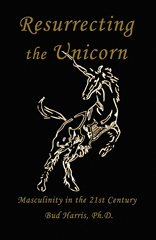by Mel Mathews
Perhaps that 'Old Time' religion has failed us, or at least the deeper meaning of symbols and metaphors have been lost to misinterpreted literalism and that 'old king,' religious fundamentalism. Blindly following old time beliefs and attitudes in their many forms and guises is following our forefathers right over the cliff and into a vast sea of disillusionment and meaninglessness. Will we repeat this by following along with a host of fundamentalist ideals, the endless pursuit of materialism at the expense of our ecology, and other forms of meaningless neurotic suffering, or we will be moved to willingly and consciously suffer the unknown, until these old time religious symbols become alive within and take on authentic meaning as opposed to being a useless, lifeless, hand-me-down relic?
Instead of completely running away from, or blindly following, perhaps we could begin to question these old religions and fundamentalisms, begin to confront and dialogue with these calcified God-Images, and find that lost nugget of gold - the transcendent. After all, like a reoccurring nightmare, these haunting literalized religious concepts and other 'old king' values will not go away until their embedded images are exposed and truly given their due.
Edward F. Edinger’s Transformation of the God-Image and Lawrence W. Jaffe’s Celebrating Soul are two fine publications that address such concerns.
 Transformation of the God-Image
Transformation of the God-Imageby Edward F. Edinger
with a foreword by Lawrence W. Jaffe
"Whoever knows God has an effect on him."
--C.G. Jung, Answer to Job.
From Lawrence W. Jaffe’s Foreword of Transformation of the God-Image:
Despite the Biblical imagery, this book is not concerned with traditional religion. Its subject, rather, is psychology, the scientific study of the soul. References are to Job, God and Christ because our deepest feelings still resonate to that imagery. Put another way, the reason for the Biblical references is because "Jungian psychology has the task of introducing to the world a new world view" (Edinger, Aion). The roots of this new world view lie in the Judeo-Christian myth.
If, as Edinger predicts, Jung's works are one day read as Scripture once was--for sustenance of our souls, for moving words that touch us to the heart, for reassurance, guidance and orientation--Answer to Job will surely occupy a unique place in the Jungian canon. The special status of Answer to Job as the most complete statement of Jung's essential message has long been acknowledged by Jungians, who have discussed it in countless seminars and conferences since its publication in 1952.
What has sparked all this interest is that the central theme of Answer to Job--the transformation of God through human consciousness--is the central theme, too, of Jungian psychology. Not long before his death Jung himself affirmed its importance, remarking that he would like to rewrite all of his books except Answer to Job, which he would leave just as it stands.
Answer to Job contains the kernel, the essence, of the Jungian myth, and Edinger's study of it, at once erudite and down-to-earth, thoughtful and heartfelt, evokes that essence with unequaled clarity and power.

Celebrating Soul by Lawrence W. Jaffe
"Man has a soul and there is a treasure buried in the field."
--C.G. Jung
People are beginning to bump up against the limits of materialism and rationalism, realizing that these fail to offer something essential, a purpose in life. Although a few turn back to institutional religion for orientation, many find that road barred to them by their reason and their skepticism. Whatever form the new religion takes it must leave a large place for reason. The new religion will therefore be the product of a marriage between reason and faith, science and religion.
We cannot do without meaning in our lives. Meaning cannot be established objectively; it arises only through a relationship with the inner, subjective world. But it is precisely that realm that has been discredited in our day by the misapplication of the scientific spirit. In compensation, this book describes and gives examples of the inner life in order to help the reader sense the reality of the soul. It explores the spiritual significance of Jungian psychology--its message of personal and cultural renewal for a civilization that has lost its sense of purpose.
In Celebrating Soul, Lawrence Jaffe helps to expose what has been lost in literal translations and brings us into deeper relationship with the symbolic and metaphoric value of concerns such as:
* The New Religion
* The Jungian Myth
* Jungian Spirituality
* What Is Our Purpose in Life?
* The Hymn of the Pearl
* Breaking the Chain of Suffering
* The Golden Rule and the Iron Rule
* The Wounded Inner Child in the Bible
* The Lesson of Job
* The Meaning of Suffering
* Holding the Opposites As Service to God
* Wrestling with the Angel
* The Redemptive Value of Consciousness
* A New Form of Worship
* The Healing of Childhood Wounds
* Success Versus Consciousness
* Jung on the Life of Christ
* Studying Torah and Studying Jung
* Redemption Through Shadow Work
* A Psychological View of the First Commandment
* Testimony to the Holocaust
* Death and Resurrection
* Being "Born Again"
* Individuation and the Bible
* Jung and the Bible on Love
* New Life in Late Life
* A Psychological Gloss on a Benediction
* The Problem of Prayer
* Christ As a Model for Individuation
* Reason and Statistics
* Self-Knowledge Gives Meaning to Life
* The Answer Lies Within
* Psychotherapy As Sabbath
